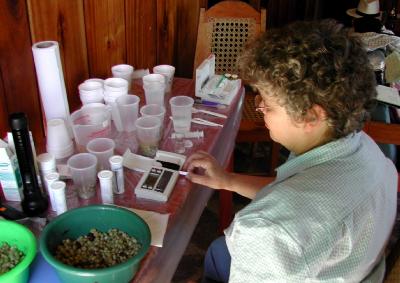August 5, 2004
Local couple work to make the coffee they love even better
Susan and Charles Jackels love their coffee. They love it so much, in fact, that they not only drink it but also travel to the coffee fields in the mountains of Nicaragua and work with farmers to make the coffee even better.
On an ordinary school day you’d find Charles Jackels at the UW Bothell, where he teaches computational science and environmental science, including classes on the chemistry of the environment. Meanwhile, Susan Jackels teaches chemistry across town at Seattle University.
But the Jackels are anything but ordinary. Last winter, with the support of Catholic Relief Services, Nicaragua’s Fair Trade and Organic Coffee Initiative and their Nicaraguan partner the Association for the Development and Diversification of Agricultural Communities, they assembled a mobile laboratory and lent their scientific expertise to the small-scale coffee farmers in Nicaragua. For two months last winter the Jackels studied coffee fermentation on organic farms in the country’s Matagalpa region. Fermentation is a necessary step in coffee processing, but too much of it can affect the coffee, and give it an unpleasant off-taste.
The original idea for the project arose from conversations over the last three years between Susan Jackels and colleagues at the University of Central America, Managua. She decided to devote a significant part of her research effort to this problem, both in her lab at SU and in the field in Nicaragua. As they were planning their sabbatical leaves for this year, Charles became interested in the project and decided to join the effort. They plan to return to Nicaragua during November and December this year to continue their coffee fermentation field study.
In Nicaragua, much coffee is produced by poor, small-scale farmers, who in recent years have been unable to sell their harvest for a price that can sustain their farms and families. Their coffee is generally of excellent quality but is vulnerable to inconsistencies in the processing conditions.
Farmers ferment coffee beans on the farm after the outer skin and fruit have been mechanically removed. This fermentation loosens a thick sticky layer that remains on the beans, allowing it to be washed off before the beans are dried on the farm. The duration and biochemical nature of this step is critical to the production of high-quality coffee. Farmers have relied on traditional rules of thumb as to the time and conditions to employ in this process. The Jackels are trying to develop chemical tests that are appropriate for use on the farm that will predict when the fermentation process will be complete.
“If we are successful in this effort, the farmers will be able to employ this technology to systematically improve the quality of their coffee,” said Susan Jackels. “As far as I know this is the first field research on small-scale coffee farms in Nicaragua. We’re hoping that what we have learned may lead to practical improvements for farmers.”
The work the Jackels do in the coffee fields is not unrelated to their teaching in Washington. Both put their chemistry expertise to work on the project, and for Charles there are also many environmental science implications, particularly on water quality, having to do with processing of coffee in Nicaragua. He said, “The environmental water quality problems are likely to motivate watershed modeling studies, an area that I plan to develop and teach at UW Bothell.”



